Sidi Mohammed Daddach is a Sahrawi human rights activist imprisoned for 24 years. He is often called "North African Mandela" or "Sahrawi Mandela".
The Independence Intifada or the Second Sahrawi Intifada and also May Intifada is a Sahrawi activist term for a series of disturbances, demonstrations and riots that broke out in May 2005 in the Moroccan-controlled parts of Western Sahara and south of Morocco. This event has also been called The El-Aaiun Intifada by the same sources.
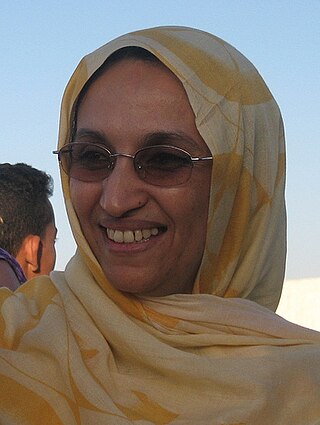
Aminatou Ali Ahmed Haidar, sometimes known as Aminetou, Aminatu or Aminetu, is a Sahrawi human rights activist and an advocate of the independence of Western Sahara. She is often called the "Sahrawi Gandhi" or "Sahrawi Pasionaria" for her nonviolent protests. She is the president of the Collective of Sahrawi Human Rights Defenders (CODESA). She was imprisoned from 1987 to 1991 and from 2005 to 2006 on charges related to her independence advocacy. In 2009, she attracted international attention when she staged a hunger strike in Lanzarote Airport after being denied re-entry into Moroccan Western Sahara. Haidar has won several international human rights awards for her work, including the 2008 Robert F. Kennedy Human Rights Award, 2009 Civil Courage Prize and 2019 Right Livelihood Award.

Tifariti is an oasis town and the temporary capital of the Sahrawi Arab Democratic Republic, located in north-eastern Western Sahara, east of the Moroccan Berm, 138 km (86 mi) from Smara and 15 km (9 mi) north of the border with Mauritania. It is part of what Polisario Front calls the Liberated Territories and Morocco call the Buffer Zone. It has been the de facto temporary capital of the Sahrawi Arab Democratic Republic since the government moved there in 2008 from Bir Lehlou. It is the headquarters of the 2nd military region of the SADR.
Lemseid or Lamssid(Arabic: لمسيد) is a small town near El-Aaiun in the Saguia el-Hamra part of Western Sahara, close to the Saguia el-Hamra itself.

The Government of Morocco sees Western Sahara as its Southern Provinces. The Moroccan government considers the Polisario Front as a separatist movement given the alleged Moroccan origins of some of its leaders.
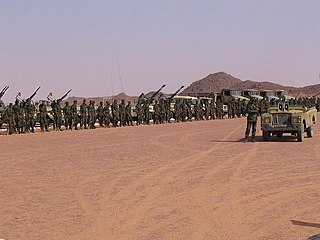
The Western Sahara conflict is an ongoing conflict between the Sahrawi Arab Democratic Republic/Polisario Front and the Kingdom of Morocco. The conflict originated from an insurgency by the Polisario Front against Spanish colonial forces from 1973 to 1975 and the subsequent Western Sahara War against Morocco between 1975 and 1991. Today the conflict is dominated by unarmed civil campaigns of the Polisario Front and their self-proclaimed SADR state to gain fully recognized independence for Western Sahara.

The Sahrawi Association of Victims of Grave Violations of Human Rights Committed by the Moroccan State, or ASVDH, is a Sahrawi human rights organization in the Moroccan-occupied areas of Western Sahara.

Brahim Dahane is a Sahrawi human rights activist and president of the Sahrawi Association of Victims of Grave Human Rights Violations Committed by the Moroccan State.
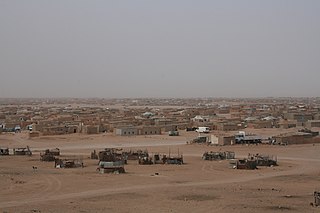
The Sahrawi refugee camps, also known as the Tindouf camps, are a collection of refugee camps set up in the Tindouf Province, Algeria in 1975–76 for Sahrawi refugees fleeing from Moroccan forces, who advanced through Western Sahara during the Western Sahara War. With most of the original refugees still living in the camps, the situation is among the most protracted in the world.

The Western Sahara War was an armed struggle between the Sahrawi indigenous Polisario Front and Morocco from 1975 to 1991, being the most significant phase of the Western Sahara conflict. The conflict erupted after the withdrawal of Spain from the Spanish Sahara in accordance with the Madrid Accords, by which it transferred administrative control of the territory to Morocco and Mauritania, but not sovereignty. In late 1975, the Moroccan government organized the Green March of some 350,000 Moroccan citizens, escorted by around 20,000 troops, who entered Western Sahara, trying to establish a Moroccan presence. While at first met with just minor resistance by the Polisario Front, Morocco later engaged a long period of guerrilla warfare with the Sahrawi nationalists. During the late 1970s, the Polisario Front, desiring to establish an independent state in the territory, attempted to fight both Mauritania and Morocco. In 1979, Mauritania withdrew from the conflict after signing a peace treaty with the Polisario Front. The war continued in low intensity throughout the 1980s, though Morocco made several attempts to take the upper hand in 1989–1991. A cease-fire agreement was finally reached between the Polisario Front and Morocco in September 1991. Some sources put the final death toll between 10,000 and 20,000 people.
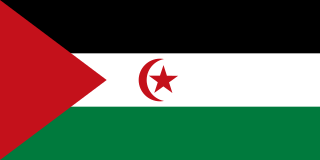
The following outline is provided as an overview of and topical guide to the Sahrawi Arab Democratic Republic:

Mariem Hassan was a Sahrawi singer and lyricist from Western Sahara. She usually sang in Hassaniyya, an Arabic dialect spoken mostly in Western Sahara and Mauritania, and occasionally in Spanish. Her use of the Spanish language was related to the former status of Western Sahara as a Spanish colony.

Elkouria Amidane is a Sahrawi student and human rights activist. Elkouria Amidane has over the years conducted non-violent struggle for Western Sahara self-determination and demonstrated for Saharawi student's rights against Morocco. Elkouria Amidane was awarded the Student Peace Prize in 2009 for her work for human rights and the Saharawi people. Elkouria Amidane was awarded the Ordfront Democracy Prize at the Swedish parliament.

The 2011 Western Saharan protests began on 25 February 2011 as a reaction to the failure of police to prevent anti-Sahrawi looting in the city of Dakhla, Western Sahara, and blossomed into protests across the territory. They were related to the Gdeim Izik protest camp in Western Sahara established the previous fall, which had resulted in violence between Sahrawi activists and Moroccan security forces and supporters. The protests also purportedly drew inspiration from the Arab Spring and successful revolts in Tunisia and Egypt, although the Arab Spring proper did not reach Western Sahara.

Brahim Ghali is a Sahrawi politician, military officer and current president of the Sahrawi Arab Democratic Republic (SADR), formerly its ambassador to Algeria and Spain.
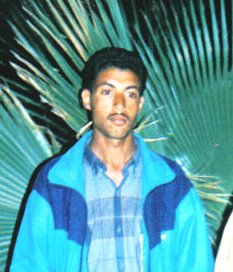
Hamdi Lembarki was a Sahrawi activist who was killed by Moroccan police after a demonstration in El Aaiun, during the Second Sahrawi Intifada in 2005.

Mexico–Sahrawi Republic relations are the current and historical relations between Mexico and the Sahrawi Arab Democratic Republic (SADR). Mexico recognized the SADR on 8 September 1979.
The Western Sahara peace process refers to the international efforts to resolve the Western Sahara conflict. The conflict has failed so far to result in permanent peace between Morocco and the Polisario Front. The standing issues of the peace process include Sahrawi refugees, and human rights in Western Sahara.

El Aaiun refugee camp is one of the Sahrawi refugee camps located in Tindouf province in southwest Algeria. It is located 5 miles from Tindouf. According to UNHCR statistics for 2003, the camp had a population of 36,675 Sahrawi refugees. The Algerian Red Crescent estimated that approximately 39,000 Sahrawi refugees live in the refugee camp.















